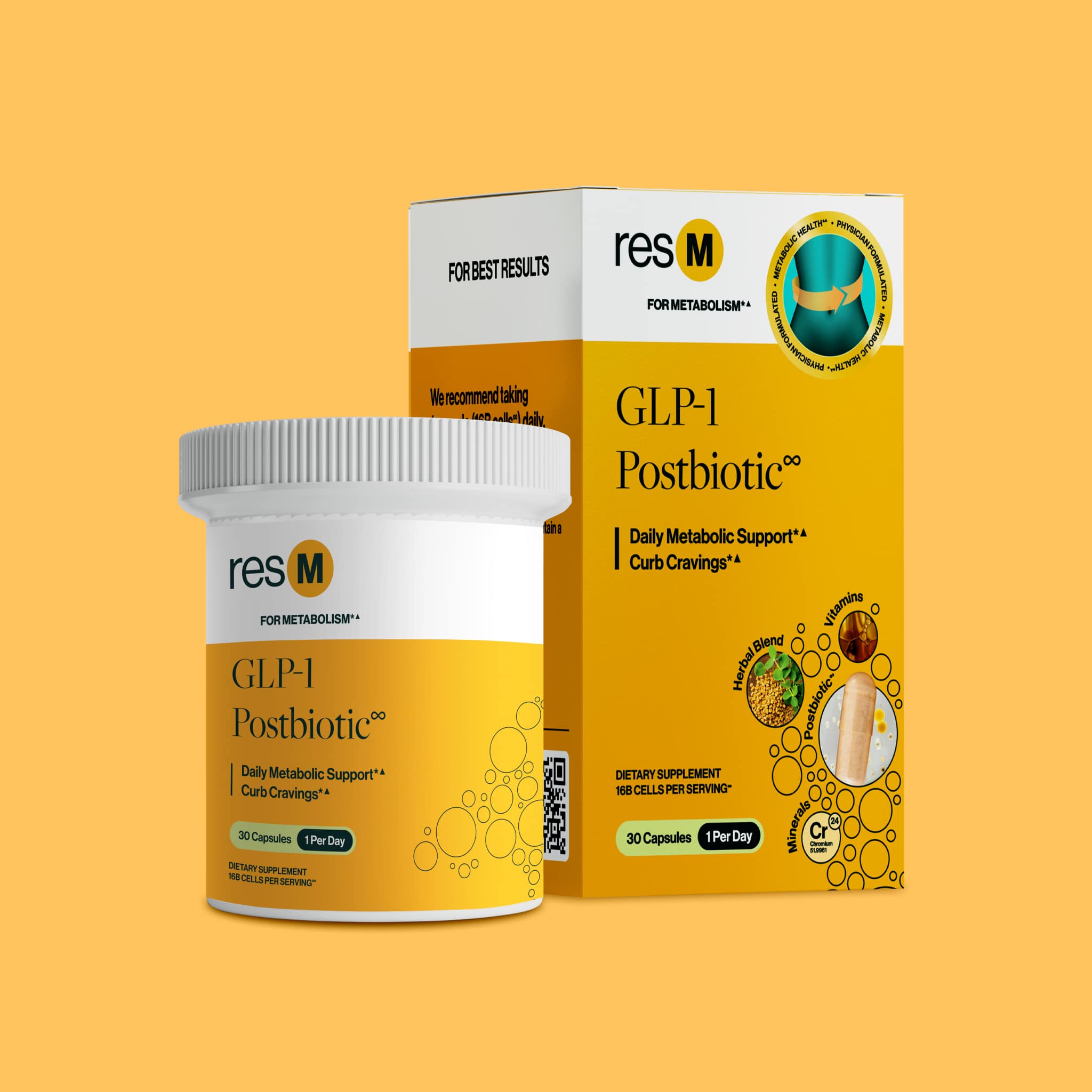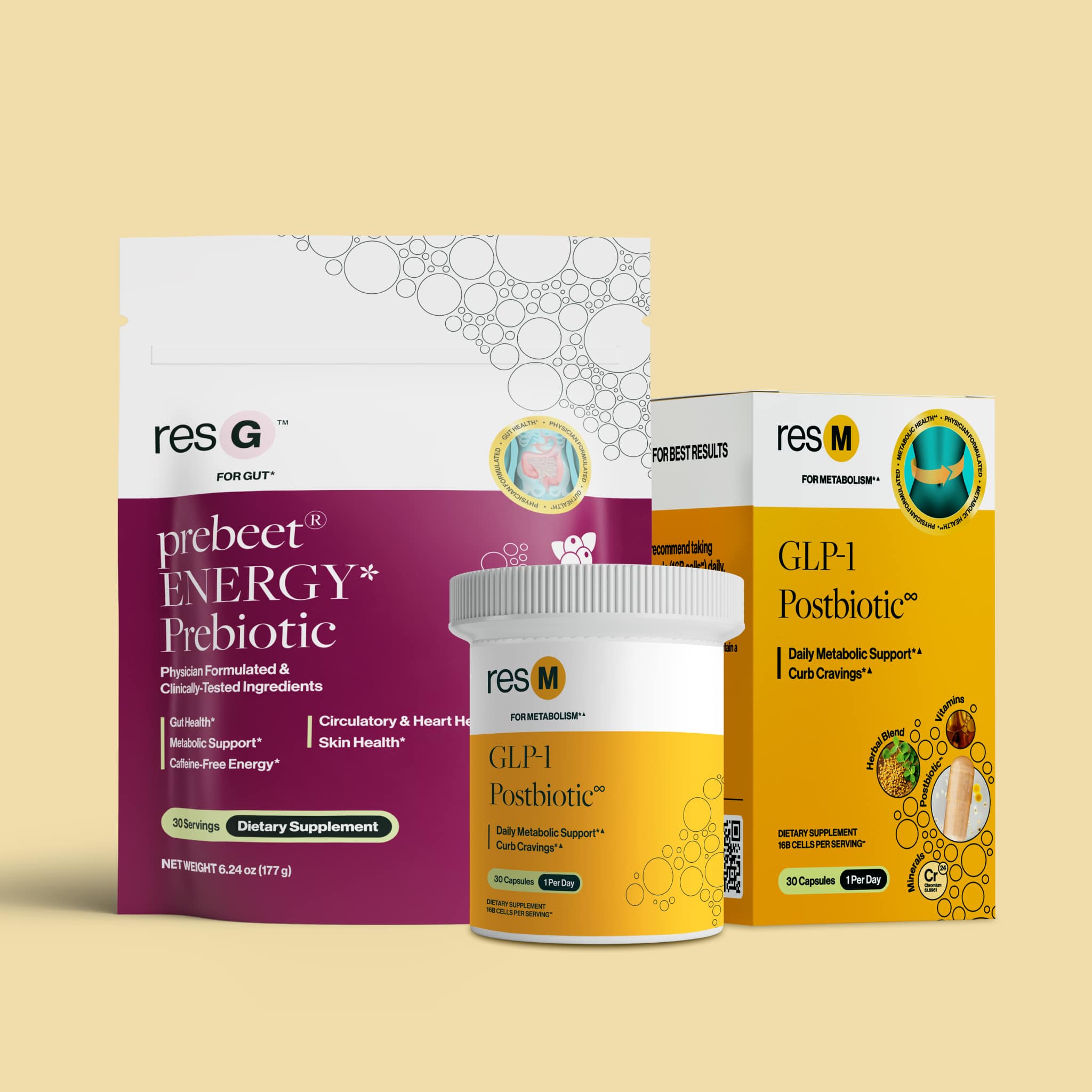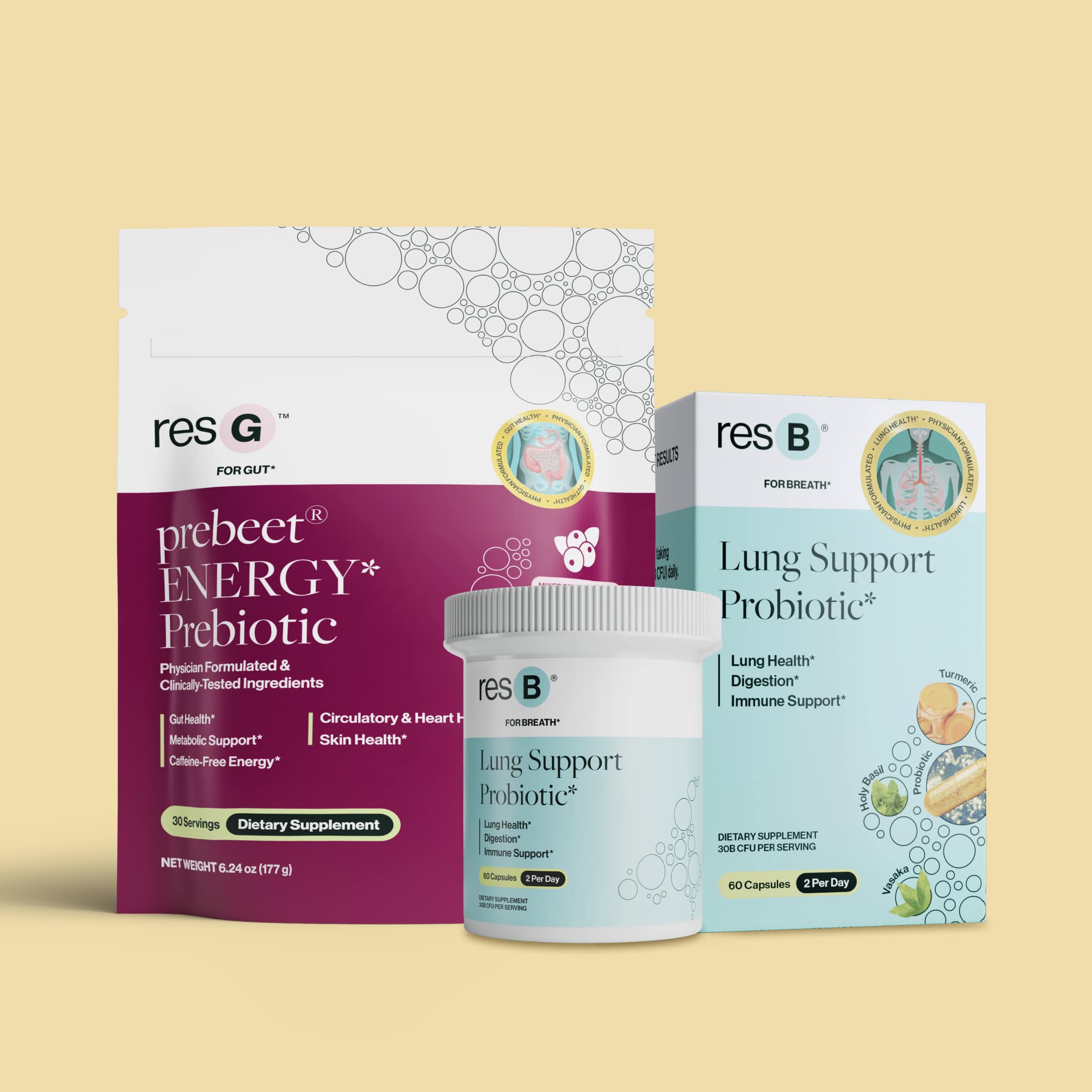
GLP-1 drugs like Ozempic, Wegovy, and many others have soared in popularity - first as a treatment for diabetes, and more recently, as an easy way to manage weight. But it’s no secret they come with side effects, such as GLP-1 fatigue.
You’re not alone if you’re constantly exhausted, no matter how much rest you get. This side effect can show up in the form of brain fog, poor physical performance, irritability, forgetfulness, and more. It takes a toll on how you live your life - but we’ll share strategies to help.
You’ll also discover why a natural alternative to semaglutide could be a smarter option, helping you regain your energy and vigor while still enjoying many of the same benefits GLP-1 drugs have to offer.
Resbiotic does not make alternatives to GLP-1 drugs. However, our resM GLP-1 probiotic is a gentle, natural way to quiet food noise.*
Many of the independent clinical evaluations we’ve received talk about the effect resM can have on supporting natural GLP-1 production for a healthy metabolism, on energy, leading to a better sense of balance and fewer crashes.* Customers themselves talk about this benefit as well. Learn more about the science behind resM today!
“It helps my body feel more balanced.” - Henry
“One pill, once a day, no problems and better fitting jeans.” - Emily
“Biggest change: no more afternoon sugar cravings and crashes.” - Lucia



What is “GLP-1 Fatigue?”
Persistent tiredness and low energy are common side effects of GLP-1 receptor agonist medications such as Ozempic, Wegovy, or Mounjaro. But the truth is, fatigue is more than just being tired.
People describe feeling sluggish even after a full night’s sleep, struggling to concentrate during the day, and lacking the motivation to keep up with normal routines. Some notice dips in stamina during physical activity, while others report mental fatigue or a sense of “brain fog” that makes work and daily tasks harder to manage.
It’s often a part of the adjustment period for these types of drugs, and tends to get a little better as the body adapts. That said, many find that GLP-1 fatigue lingers and interferes with quality of life. So, why does GLP-1 cause fatigue?
Why Does GLP-1 Cause Fatigue?
Fatigue on GLP-1 drugs makes sense once you have a better understanding of how exactly they work. You’re altering your digestion, metabolism, and even brain signaling - all things linked to energy levels.
Impact of GLP-1 Drugs on Digestion and Energy
GLP-1 medications slow gastric emptying, meaning food stays in the stomach longer. . This helps you feel full on smaller portions and reduces the urge to overeat. Since nutrients are released more slowly into the digestive tract, glucose or our primary energy source, enters the bloodstream at a steadier pace. On top of that, you have less of an appetite in general on GLP-1 drugs - so you eat fewer calories overall. The body is used to getting 3,000 calories per day, but all of a sudden is only given 2,600 calories a day - that takes a toll.
Nutrient absorption is another link between GLP-1 and fatigue. It’s easy to come up short on the vitamins, minerals, and macronutrients that normally drive energy production when food is eaten in much smaller amounts or not enough.
Hormonal and Metabolic Factors
Aside from the eating factor, GLP-1 drugs influence insulin release and blood sugar levels. This is why they were originally designed as a way to manage diabetes. But it can sometimes lead to energy crashes if blood sugar dips too low.
In the long run, some studies suggest these drugs may contribute to muscle loss along with fat loss. This is another change directly impacting stamina and strength, leaving patients feeling “weak.”
Psychological and Neurological Links
The gut and brain are tightly connected through the vagus nerve and hormone signaling. So, GLP-1 medications can also influence mood and mental clarity by altering how hunger and fullness cues are transmitted.
A lot of people report brain fog or a slower sense of thinking that goes hand in hand with physical fatigue. This isn’t all that surprising. The brain is the first to notice when the gut is processing food differently and the body is running on less fuel.
How Long Does GLP-1 Fatigue Last?
There are a lot of moving pieces behind GLP-1 fatigue - but is this a permanent change? If not, how long does GLP-1 fatigue last? Unfortunately, there’s no one-size-fits-all answer here.
Many patients feel the strongest fatigue in the first few weeks, especially when their dose increases. This is when the body is adjusting to slower digestion and reduced food intake. Some people do adapt over time, but that’s not always the case. Here are some of the factors at play influencing what you expect from your GLP-1 fatigue timeline:
- Dosage level and escalation speed: Faster dose increases come with stronger fatigue.
- Baseline health: Existing nutrient deficiencies or metabolic issues might make you feel even more drained.
- Diet and hydration: Poor food quality or low hydration can worsen symptoms.
- Gut health: A compromised microbiome can amplify side effects and slow recovery.
You can reasonably expect your energy levels to improve once your body finds its new normal. But fatigue can be an ongoing issue tied to low calorie intake, nutrient gaps, or underlying gut health problems.
This is why patients often feel as if they’re being held hostage: the medication is helping them lose weight, but it’s also holding them back from feeling fully alive. The good news, though, is there are ways to manage fatigue from GLP-1 medication.
What Are Some Effective Strategies For Managing Fatigue as a Side Effect of GLP-1 Medications?
Feeling drained while on a GLP-1 medication can be frustrating, especially if you’re otherwise seeing progress with blood sugar or weight.
But if you ever find that it becomes too much, just know you have more options at your fingertips that don’t come with a laundry list of issues.
Nutrition and Hydration Adjustments
Food and water are the body’s most basic fuel, and GLP-1 drugs directly change how both are used. The main issue is you’re not going to feel as hungry, and that’s the point of this type of medication. Here’s how you can counter the calorie gap without getting in the way of results:
- Focus on protein: Eat a lean source like eggs, chicken, fish, tofu, or legumes at each meal to preserve muscle mass and get a steadier energy release than quick carbs offer.
- Eat smaller, balanced meals: Instead of skipping meals entirely, try spreading smaller portions across the day to keep blood sugar from dipping too low.
- Choose nutrient-dense foods: Leafy greens, berries, nuts, and whole grains pack more vitamins and minerals into each bite. They support both metabolism and energy.
But don’t overlook hydration, either. Dehydration can sneak up quickly on these drugs. Sip water throughout the day, but avoid chugging large amounts with meals, which can worsen fullness and discomfort. Adding electrolytes can also help if fatigue comes with lightheadedness.
Prioritize High-Quality Sleep and Stress Management
True fatigue isn’t managed through sleep alone. But GLP-1 fatigue often feels heavier when sleep quality is already poor. Unfortunately, these drugs can also disrupt sleep in some people, so being intentional with your nighttime routine matters. Here are some tips:
- Stick to consistent bedtimes so your body learns when to wind down.
- Cut back on screens before bed, since blue light interferes with melatonin production.
- Experiment with light activity like stretching, yoga, or a walk after dinner to improve sleep depth.
As for managing stress, practices like journaling, breathwork, or even short breaks outdoors help calm the nervous system. Fatigue lingers when stress hormones stay high, no matter how much you rest.
Track Symptoms to Identify Fatigue Patterns
Fatigue doesn’t always show up at random. It tends to follow a pattern - be it after dose increases, after certain foods, or at a specific time of day. Keep a simple log of:
- What you eat and when
- Your medication timing and dose
- Daily energy levels
This will help you start to spot connections. Maybe fatigue always spikes after a heavier meal, or in the afternoon following skipped snacks. Whatever the case, uncovering these trends helps you pivot your routine accordingly.
Discuss Dose Adjustments With a Healthcare Provider
Not all GLP-1 fatigue has to be tolerated. At a certain point, it may be worth slowing down dose escalation or trying a lower maintenance dose. Talk with your doctor about how treatment is impacting daily life, and they may recommend dose staggering.
Switching to a different GLP-1 drug altogether makes a difference in some cases, too - be it Byetta vs Ozempic or Bydureon vs Ozempic. Your doctor knows your health and situation best, so lean on them throughout this journey.
Monitor For Vitamin/Mineral Deficiencies That May Be Contributing
Nutritional gaps are common because GLP-1 drugs reduce food intake. Low levels of B vitamins, vitamin D, iron, or magnesium can all leave you feeling more drained than usual. Simple bloodwork can confirm if you’re running low, and supplementation can often bring relief.
Put GLP-1 Fatigue in the Past With a Smarter, Gentler Alternative
Whether you’re struggling with GLP-1 fatigue, GLP-1 nausea, or any other of the many side effects these drugs come with, it may be time to explore something kinder to your energy.
resM is a carefully designed blend that helps activate your body’s own GLP-1 signaling, without injections or the fatigue that can follow.* Pre-clinical studies showed it boosts natural GLP-1 production by as much as 300%!*
resM is packed with a heat-inactivated probiotic, chromium, fenugreek, white mulberry, plus vitamins D3 and B12 to support appetite control, steady healthy blood sugar already in normal range, and immune health - all while helping quiet food cravings.*
It’s vegan, non-GMO, free of common allergens, and designed for everyday use, even alongside GLP-1 prescriptions or during transitions off medication.* Think of it as a way to restore your natural rhythms and hop off the fatigue cycle.* Learn more about how it can help you today!
“This fits into my routine without any extra work.” - Leslie
“I used to feel hungry all the time. Not anymore.” - Chelsea
“I’ve been overweight most of my life. I’m not expecting a miracle. I just want to feel more in control. This helps.” - Douglas
Final Words on GLP-1 and Fatigue
Fatigue on GLP-1 medications like Ozempic, Wegovy, and others is very common - and very frustrating. You might be seeing the results you want, but at what cost? The very nature of how these drugs work will likely take a toll on energy levels.
While there are ways to manage GLP-1 fatigue, long-term solutions often mean looking beyond pharmaceuticals. Gut-first approaches provide a gentler path toward sustained energy and appetite control.